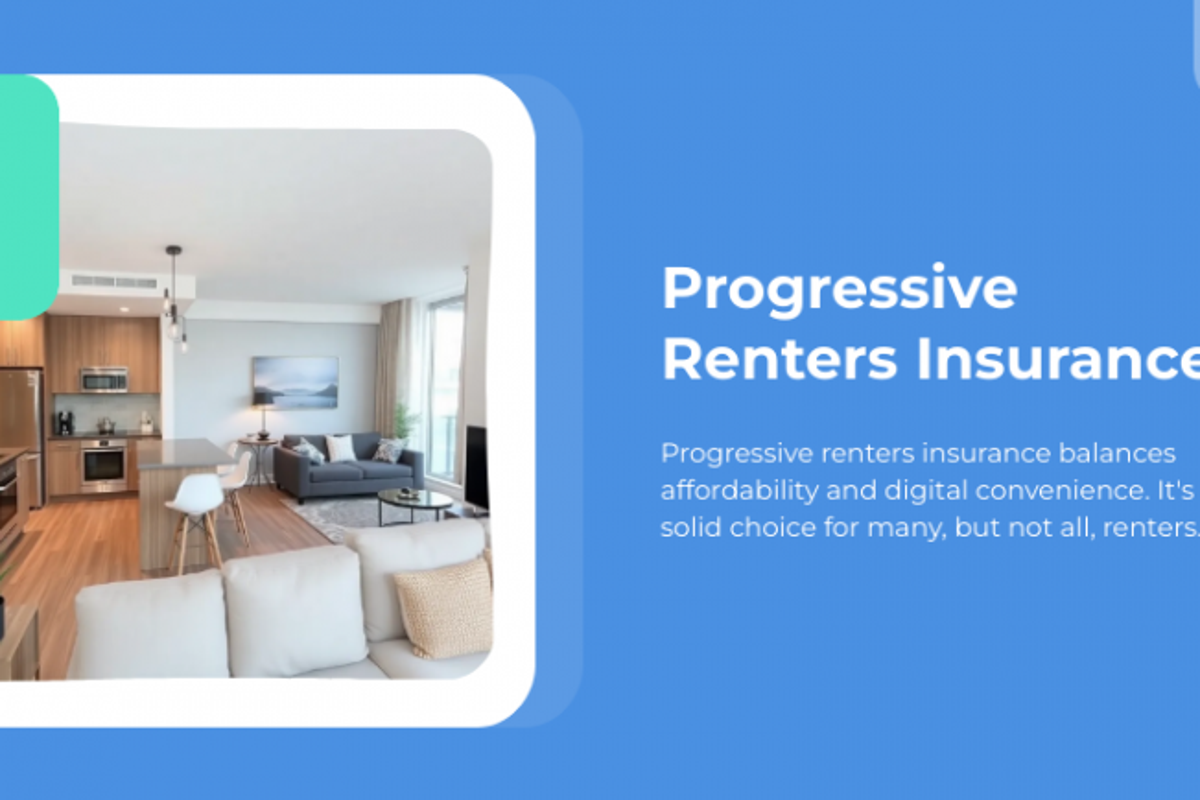Copyright benzinga

Progressive is one of the most recognizable insurance brands in the United States, known primarily for its auto coverage and national advertising presence. However, renters insurance represents a smaller yet critical segment of its business — one that appeals to tenants seeking convenience, affordability, and digital accessibility. This review examines the structure, cost, performance, and service reputation of Progressive’s renters insurance offering as it stands in 2025. It provides a factual, research-based overview of what the company delivers, how it compares to competitors, and which renters will benefit most from choosing Progressive over other carriers. Progressive Overview: Financial Strength and Business Model Progressive Corporation, headquartered in Mayfield Village, Ohio, ranks among the largest property and casualty insurers in the U.S. With an A+ (Superior) rating for financial strength from AM Best and consistent multi-billion-dollar annual revenues, the company demonstrates a stable financial foundation for paying claims. However, the structure of Progressive’s renters insurance product is worth clarifying. Progressive operates as a broker and underwriter hybrid — while it issues many policies directly, some renters insurance policies are underwritten by partner companies (such as third-party affiliates within its insurance group). This model allows Progressive to serve a broad range of customers nationally but can lead to variations in customer experience, particularly in claims handling and regional service support. This distinction matters because it explains why customer satisfaction data for Progressive’s renters insurance differs across states — a pattern confirmed in aggregated consumer reviews and regional complaint ratios. Core Coverages: What Progressive Renters Insurance Includes 1. Personal Property Coverage This covers the tenant’s belongings against covered perils such as theft, fire, smoke damage, vandalism, and certain types of water damage. The policy is written on a named peril basis, meaning only events specifically listed in the contract are covered. Progressive’s coverage reimburses the cost to repair or replace items up to the selected limit. Policyholders can choose between: Actual Cash Value (ACV): Depreciated value of items.Replacement Cost Value (RCV): Full replacement value without depreciation. RCV coverage carries a higher premium but provides stronger protection — an option Progressive allows customers to select during the quoting process. 2. Personal Liability Coverage This covers bodily injury or property damage that the renter causes to others, either within the rented property or elsewhere. Standard liability limits typically begin at $100,000 and can be increased, in increments, depending on underwriting approval and local regulation. 3. Loss of Use (Additional Living Expenses) If a covered peril makes the rental unit uninhabitable, this portion reimburses the insured for temporary housing, food, and transportation costs. 4. Medical Payments to Others This coverage pays small medical expenses for injuries to guests on the property, even when the insured isn’t legally responsible. Standard limits are usually $1,000–$5,000. Optional and Add-On Coverages Progressive provides multiple add-ons to help tailor the policy: Scheduled Personal Property (SPP): Allows customers to insure specific valuables — jewelry, watches, fine art, collectibles — beyond standard sub-limits.Water Backup and Sewer Overflow: Offers coverage for property damage caused by water backing up through drains or sump pumps — an exclusion in standard renters policies.Identity Theft Protection: Some states offer optional ID recovery services and expense reimbursement as a rider.Personal Injury Endorsement: Extends liability to cover libel, slander, or defamation claims in states where available.Pet Damage Liability: In certain jurisdictions, Progressive offers pet liability protection if an animal injures someone — distinct from pet insurance, but useful for renters with pets subject to landlord requirements. Coverage Limits and Deductible Structure Progressive’s personal property coverage typically ranges from $20,000 to $100,000, depending on state minimums and selected options. Deductibles usually fall between $250 and $1,000, with flexibility to raise or lower based on premium preference. Customers can increase liability coverage up to $500,000 in many states, though higher limits often require additional underwriting review. Loss-of-use coverage generally provides 20–30% of the personal property limit, which aligns with industry norms. Policy Accessibility and Technology One of Progressive’s defining strengths is its digital infrastructure. The quoting process is streamlined, taking an average of under 5 minutes to complete. Users can view premiums, adjust limits, and add endorsements instantly. Through the Progressive mobile app, policyholders can: Access policy documents.Manage billing.File or track claims (where handled in-house).Update contact or payment details. This technology-forward model benefits renters seeking convenience over traditional agent interaction. It also positions Progressive competitively against newer digital-first insurers targeting younger demographics. Pricing and Premium Insights Renters insurance remains one of the most affordable types of personal coverage, and Progressive positions itself near the center of the market on price. Based on aggregated pricing data for 2024–2025 across multiple consumer review sources and quoted examples: Average premium for a $30,000 property limit and $100,000 liability coverage: Typically falls between $180 and $250 annually (approximately $15–$21 per month).Higher coverage limits ($50,000 property / $300,000 liability): Average premiums range $220–$310 annually depending on location, deductible, and credit tier.Bundled customers (renters + auto): Reported savings average between 10–15%, depending on state regulation and combined policy value. Premiums are primarily influenced by: State and city risk data (fire, theft, weather).Building construction type (frame vs. masonry).Presence of safety features (sprinklers, alarms).Credit-based insurance scores.Claims history. While Progressive’s renters pricing is competitive, it rarely ranks as the lowest; its advantage lies in bundled discounts and ease of integration with existing Progressive policies, not undercutting competitors on standalone pricing. Discount Programs and Savings Opportunities Progressive’s renters insurance offers a range of discounts that can substantially reduce costs when stacked: Multi-Policy Discount (Bundling): The most substantial savings apply when combining renters with auto or motorcycle coverage.Pay-in-Full Discount: Paying the full premium upfront instead of monthly installments typically reduces total cost by 5–10%.Paperless and AutoPay: Opting for electronic documents and automatic billing provides modest recurring savings and simplifies account management.Quote in Advance Discount: Customers who secure a policy several days before the effective date qualify for reduced premiums in many states.Home Safety Features: Smoke detectors, fire extinguishers, and monitored alarms may trigger minor discounts. Although these programs mirror industry norms, Progressive’s bundle incentives are among the most consistent nationwide. Claims Handling and Service Performance Claims Process Overview Policyholders can file claims via: The Progressive mobile app.The company’s claims hotline (24/7 availability).Independent agents (if policy originated through an agent channel). In straightforward losses — such as theft or water damage — claims are typically processed within a few business days, provided documentation (receipts, photos) is available. Service Quality Indicators Third-party customer satisfaction surveys indicate mixed results. Progressive performs above average in claims availability and online experience, but below average in claim resolution satisfaction compared to insurers specializing in property lines. Common consumer themes include: Smooth policy setup and billing.Frustration over delays or lack of communication during claims escalation.Variability between states and underwriting partners. This inconsistency stems partly from Progressive’s hybrid underwriting structure, where claims may be handled by different entities. Still, Progressive’s financial stability and digital transparency remain reassuring strengths for policyholders concerned about solvency and documentation. Customer Satisfaction and Reputation Metrics Progressive maintains strong brand awareness and trust among U.S. consumers but holds average ratings for renters insurance service satisfaction. Data from large consumer research firms reveal: Overall renters insurance satisfaction scores hover in the mid-range compared to competitors.Positive ratings emphasize ease of purchase, affordable cost, and bundling convenience.Negative feedback centers on claims responsiveness and agent communication gaps. Progressive’s customer experience strategy prioritizes digital convenience over traditional, high-touch service. For tech-savvy renters, this trade-off feels acceptable. For those who prefer dedicated agent guidance during claims, the experience can feel impersonal. Financial Strength and Industry Standing Progressive’s A+ (Superior) rating from AM Best reflects a strong capital position and low risk of claim non-payment. Additionally: It ranks among the top five U.S. property and casualty insurers by market share.It consistently reports multi-billion-dollar net income and substantial surplus reserves. These fundamentals assure policyholders that, despite service variation, Progressive has the financial resources to handle catastrophic or high-volume claims events. Comparative Analysis: Progressive vs. Industry Peers Coverage Breadth Progressive’s renters insurance includes all essential protections and allows optional add-ons, matching industry leaders like State Farm, Allstate, and Liberty Mutual. However, specialized endorsements are fewer in number. Pricing Competitiveness Progressive’s pricing aligns closely with national averages — rarely cheapest, rarely highest. Its most compelling advantage is bundle pricing efficiency for customers already insured through Progressive. Claims Reputation Competitors focused on homeowners or property coverage (e.g., Amica, Erie) tend to score higher on claims satisfaction. Progressive’s mixed service ratings reflect its diversified product portfolio — renters insurance isn’t its flagship line. Technology and Ease of Use Here, Progressive leads. Its web quoting, mobile app, and account management tools consistently rank among the best in the insurance industry. Strengths Summary Financial Reliability: Backed by superior credit ratings and strong capitalization, Progressive is a secure choice.Ease of Purchase and Management: Online quoting, binding, and policy management are seamless and fast.Bundling Efficiency: Progressive’s bundling strategy provides tangible, recurring cost savings.Transparent Digital Claims Filing: Claim initiation and documentation are accessible from anywhere.Nationwide Availability: Consistent presence across nearly all U.S. states. Limitations Summary Inconsistent Claims Experience: Variability in adjuster communication and processing speed depending on state.Limited Specialty Endorsements: Fewer options for high-value items or rare collectibles compared to niche insurers.Average Service Scores: Progressive’s renters division lacks the personal engagement that competitors like Amica or Country Financial offer.Third-Party Underwriting Variance: Depending on region, some renters policies are serviced by partner insurers, not Progressive itself. Ideal Customer Profile Progressive’s renters insurance is best suited for: Standard apartment or condominium tenants seeking affordable, efficient coverage.Auto policyholders already with Progressive who can maximize bundle discounts.Digitally inclined customers who prefer self-service over agent communication. Less ideal for: Renters with extensive high-value property or specific collectible items.Customers who prioritize personalized, local claims assistance.Tenants in high-risk regions requiring niche endorsements like flood or earthquake coverage. How Progressive’s Renters Policy Fits Broader Risk Planning For renters with broader Progressive portfolios, adding renters insurance provides several strategic benefits: Cross-Policy Coordination: Claims involving auto and renters (e.g., theft from a vehicle near home) can be handled within the same ecosystem.Umbrella Policy Compatibility: Renters who purchase umbrella liability coverage benefit from Progressive’s unified policy structure.Portfolio Simplification: Managing multiple policies within one digital platform reduces administrative friction and potential billing confusion. These structural efficiencies create tangible value for long-term Progressive clients seeking consolidated risk management. Strategic Considerations Before Purchasing Before finalizing a Progressive renters policy, assess these factors: State-specific exclusions: Some perils (earthquake, flood) require separate endorsements or standalone policies.Sub-limit clarity: Verify limits on jewelry, electronics, and specialty goods.Claims documentation expectations: Keep a photographic inventory of property.Discount eligibility: Apply all applicable multi-policy, pay-in-full, and security system discounts during quoting.Policy renewal terms: Monitor annual renewal adjustments — Progressive periodically recalculates premiums based on inflation and claims ratios. Regularly reviewing coverage ensures alignment with property value and inflation trends. Long-Term Value and Reputation Outlook Progressive’s renters product reflects the company’s overall trajectory: digitally optimized, cost-competitive, and financially sound. Its strongest appeal lies in simplicity and trust in a national brand rather than premium customization or boutique service. Over the next several years, Progressive is expected to continue expanding automation in claims processing, which may close the service satisfaction gap seen in earlier reviews. As artificial intelligence and predictive analytics are integrated into underwriting, pricing precision may also improve — potentially stabilizing premiums and further rewarding low-risk renters. From a strategic lens, renters who maintain consistent coverage early in tenancy and later transition to Progressive homeowners insurance (upon purchasing property) may benefit from seamless conversion options and retained policy discounts. Should You Choose Progressive Renters Insurance? Progressive delivers a dependable, nationally available renters insurance policy backed by one of the strongest financial structures in the industry. It is not the absolute cheapest option, nor the most customizable, but it succeeds in providing solid, predictable coverage at a fair price point. The Bottom Line: Financial stability: Excellent.Coverage breadth: Comprehensive but not specialized.Pricing: Competitive, especially for bundled customers.Digital experience: Industry-leading.Claims satisfaction: Mixed, but improving with digital adoption. For tenants prioritizing affordability, convenience, and national reliability — especially those already holding Progressive auto or motorcycle coverage — this policy represents a practical and efficient choice. Those requiring elevated service attention or niche coverage (e.g., rare valuables, high-risk zones) should compare against Amica, State Farm, or specialized property insurers. Ultimately, Progressive’s renters insurance embodies the company’s brand identity: straightforward, modern, and built for everyday customers who value function over flair. It is a strong fit for most renters — provided expectations are set accurately for service depth versus cost efficiency.



